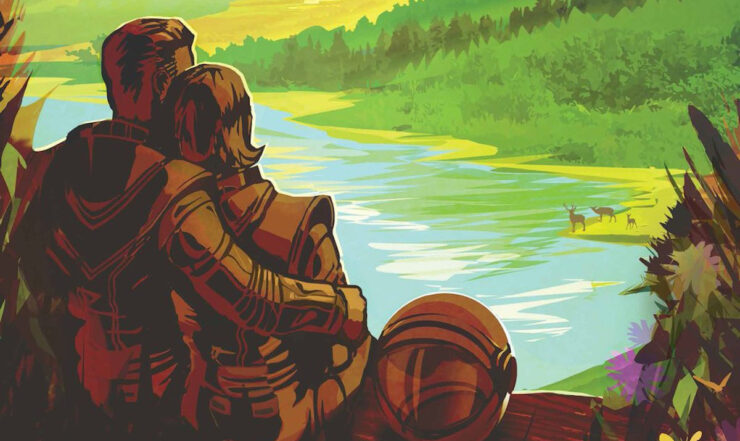These days it’s easy to imagine a world transformed by human ingenuity from the verdant wildernesses that preceded human civilization to lifeless deserts surrounded by anoxic oceans, a world well on its way to become a runaway hot, wet greenhouse planet not unlike Venus circa 700 million years ago. We know that is what many people want, because that is what they are, by greed or apathy, choosing.
Some SF authors prefer to follow their imaginations along entirely different lines. These people prefer worlds with ecological complexity comparable to a pre-Holocene extinction Earth, worlds in which the human role isn’t to cheerfully carve holes in the network of life. It could happen! It’s more likely than faster-than-light travel or time travel, and look how many books have featured those!
Don’t believe me? Here are five works that envision environmentally responsible futures, just in time for Earth Day.
City by Clifford Simak (1952)
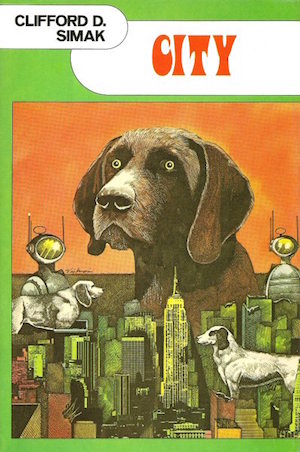
As Simak makes clear in the author’s foreword to the 1976 Ace mass market paperback edition, the short stories that together comprise City were written out of disillusionment, from the author’s conviction that “there was no limit to the horror that men would inflict on one another.” City is intended as a counterbalance to the hopeless world in which Simak found himself living.
City takes the reader from a world where cities are vanishing, to one in which the beings of Earth live tranquil lives in a pastoral wilderness. The Dogs of the distant future owe a great debt to the Webster family, in particular the wonderful knack the Websters have of making decisions for what were entirely justifiable reasons whose ultimate effect is to render humanity as we know it extinct. By the era of the Dogs, humanity is no longer a factor and the world is a happy place. At least for a time, anyway; that’s as much as we can hope for.
Aria by Kozue Amano (2002 to 2008)
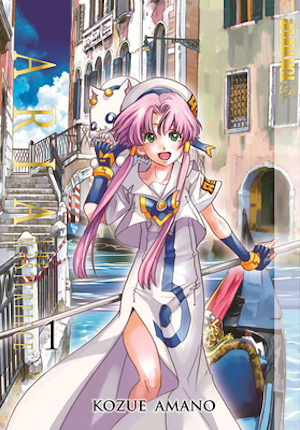
This manga’s creator is sure that humans have what it takes to be environmentally responsible. They can be creative force that can turn a dead world into a living one. In this tale, a few centuries of effort have turned the desert world Mars into the ocean-covered Aqua.
Having Thalassafied Mars, humans are content to use it as a stage on which to satisfy needs at the top of Maslow’s Hierarchy. Akari arrives in Neo-Venice determined to become an undine, a gondolier. Aria is a slice-of-life coming-of-age tale told in twelve volumes, an amiable story that provides the artist ample excuse to indulge in what TV Tropes calls “scenery porn.”
A Psalm for the Wild-Built by Becky Chambers (2021)
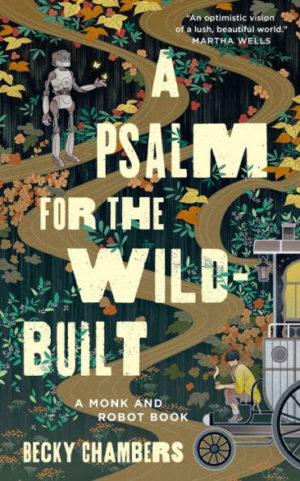
Having abruptly become self-aware, humanity’s robots eschewed the traditional pastime of conscious robots—tearing their exploitive creators limb from limb—in favour of migration from the human regions to a land the robots can call their own. Humans, in their turn, embraced the opportunity to reconsider their ways. By the time Psalm begins, humanity enjoys a peaceful, ecologically sensible way of life. As for the robots, there has been no contact with them since the Transition; their fate is unknown.
Tea monk Dex has a fancy to hear the chirping of crickets. These insects being rare, the monk’s quest leads them towards wilderness and long delayed contact with the robots. Robot Mosscap is willing to play guide to the inquisitive human, in return for which all Mosscap asks is that Dex allow the robot to satisfy its curiosity about humans. Relentlessly good-natured adventures ensue!
Foxhunt by Rem Wigmore (2021)
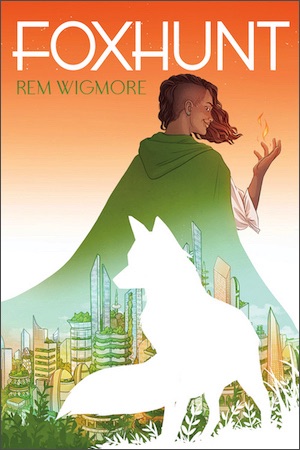
For travelling entertainer Orfeus, humanity’s brush with ecological suicide—the Brink—should be a historical curiosity as relevant to Orfeus’ life as Justinian’s Plague is to a 21st century American. Life should be a sequence of bold romantic entanglements, followed by exits of varying degrees of gracefulness.
Civilization’s ecologically conscientious ethos prevails thanks to the efforts of vigilante groups like the Order of the Vengeful Wild. The Vengeful Wild prioritizes zeal and swift punishment over due diligence. This is a problem for Orfeus, who has been targeted by the Vengeful Wild for crimes Orfeus is certain she did not commit. Convincing the Vengeful Wild of her innocence could be impossible… unless Orfeus inveigles her way into the Order and unravels the case from the inside.
A Half-Built Garden by Ruthanna Emrys (2022)
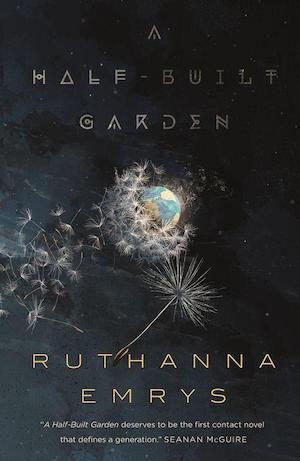
The Dandelion Revolution broke the power of the great corporations and old nations. The dominant polity is watershed-based, the ruling credo focused on rebuilding sustainable ecologies. The bad old past isn’t that far past. Thus, when Judy Wallach-Stevens is alerted to soaring phosphate levels, she expects a leaking relic or perhaps some modern scofflaw… Aliens were not what she expected, but aliens are what she gets.
Humans are the first living technological civilization the alien Ringers have managed to contact. The space-dwelling aliens are here to save humanity from itself. More exactly, the Ringers are here to save us from Earth, from the limits of planet-bound existence before those limits destroy us. This is an offer people like Wallach-Stevens have no interest in accepting. If only the Ringers were not so completely sure of themselves; they are convinced that refusal would be the kind of delusion typical of an immature civilization and as such, to be ignored.
***
Many authors have tried their hand at similar themes of ecological responsibility. These five books are, therefore, only the tip of a very large iceberg. The odds are good that the five above do not include one of your favourites. If so, feel free to mention them in comments, which are, as ever, below.
In the words of fanfiction author Musty181, four-time Hugo finalist, prolific book reviewer, and perennial Darwin Award nominee James Davis Nicoll “looks like a default mii with glasses.” His work has appeared in Interzone, Publishers Weekly and Romantic Times as well as on his own websites, James Nicoll Reviews (where he is assisted by editor Karen Lofstrom and web person Adrienne L. Travis) and the 2021 and 2022 Aurora Award finalist Young People Read Old SFF (where he is assisted by web person Adrienne L. Travis). His Patreon can be found here.










